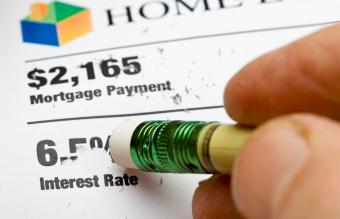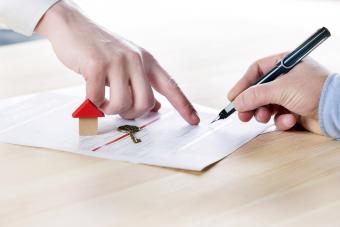
It is important to understand the relationship between house mortgage debt and death.
What Is a Mortgage?
The mortgage is the lien on the house or other property that secures the loan that you take out from a lender. The property is the collateral; if you do not make the required payments on the mortgage, the lien gives the lender the right to sell the property to recoup the money that you borrowed.
The mortgage has three components: the value, interest rate, and length of the loan. Mortgages are long-term commitments with lengths typically from 10 to 30 years. With such long periods of time covered by the loan, it is possible that one of the people who signed the loan may die during the term. Just because a signer dies, the house mortgage does not disappear after death.
House Mortgage Debt and Death
Who has to pay the rest of the mortgage after death depends on the mortgage itself, which person died, and the amount of money left in the estate.
Death of a Mortgage Co-Signer
If two spouses or significant others signed a mortgage, the surviving partner is responsible for paying the rest of the mortgage after the death of one. That situation is pretty straightforward. It gets more complicated if the only signer on the mortgage dies.
Death of an Individual
If the only name on a mortgage dies, the person's estate is responsible for paying the remainder of the debt. The estate consists of all assets like cash, property, investments, and possessions; the management of the estate is handled by an executor or an attorney.
Estate law varies from state to state. Some states take a living allowance for the family out of the estate cash up front and pay for the funeral expenses. The creditors then can start to collect on their debts. Others may omit the family allowance and start with the funeral expenses and the creditors. The mortgage lenders are considered one of these creditors. If there is not enough money in the estate to pay all of the debts owed on the estate, the house may be sold to get the money to pay the debts, including the mortgage. If a family member wants to retain the house, he or she has to repay the balance of the loan. This can be done with cash or by securing another loan in his or her name to pay the lender.
In some instances, the mortgaged property may be left to an individual through the will. The mortgage would still have to be paid through the estate, which may lessen the amount of the overall estate.
The remaining money gets distributed to the beneficiaries of the estate. To avoid having to sell the house or property to pay the remaining amount on the mortgage, buyers may purchase mortgage insurance.
Mortgage Insurance
There are several types of mortgage insurance. Private mortgage insurance is a policy that is designed to protect the lender against a default on the loan by the borrower. Many lenders will not grant the original mortgage unless there is private mortgage insurance purchased. Upon default, the benefit is paid to the lender and not the family. In the event of a death, the private mortgage insurance may or may not pay off the lender; the estate would have to contact the lender to get more information.
On the other hand, mortgage protection insurance can assist the estate in case of an unexpected death. This type of insurance is like a life insurance policy for your mortgage. Depending on the type of policy you purchase, your estate may receive either the remaining balance on the mortgage or, sometimes, the entire face value of the loan. The beneficiary can use the money to pay off the loan and whatever extra money remaining can be used as desired.
The death of a loved one is a challenging time; having to deal with the estate and unpaid debts may seem to be overwhelming. With some preparation beforehand, dealing with house mortgage debt and death can be a less stressful experience.







